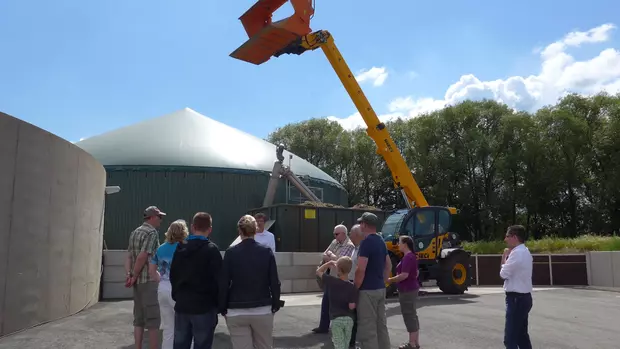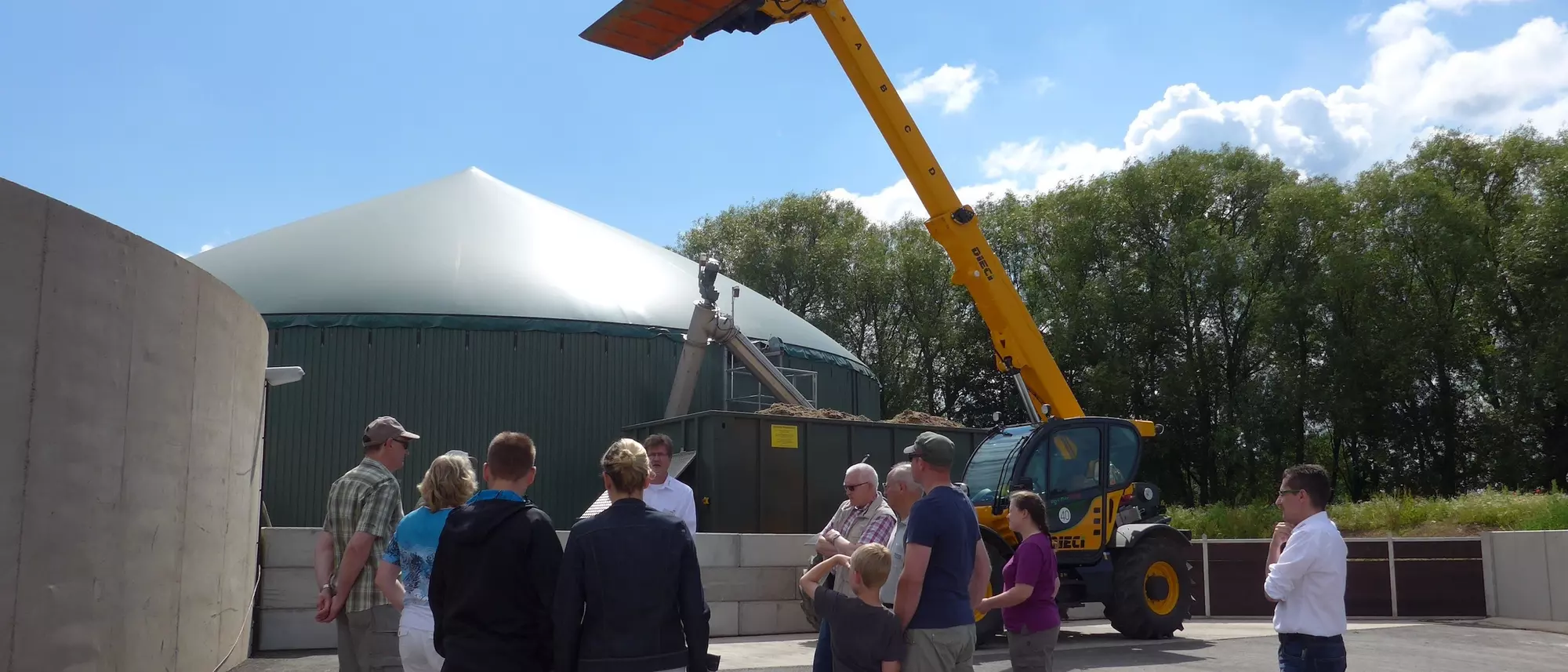
The highly efficient MIT.BIO biogas plant in Heuchelheim has been producing climate-friendly electricity and heat since November 2013. At last Sunday's Open Farm Day, thousands of visitors took the opportunity to see this milestone in the regional energy transition for themselves - including representatives from farmers' organisations and politicians.
On Sunday 15 June, the farm of Hans and Thorsten Klug in Heuchelheim was bustling with visitors. More than 3,000 interested visitors - including many families - were able to gain an impression of the two farmers' day-to-day work. The Gießen/Wetzlar/Dill Farmers' Association and the Klug family had organised this open farm day. "Very few people know exactly how a modern farm works. Today we are once again offering the opportunity to take a look behind the scenes and ask questions," explained Manfred Paul, Chairman of the Gießen/Wetzlar/Dill Farmers' Association.
Children, young people and adults learnt, among other things, how farm animals live, which machines farmers use and where regionally produced food - energy suppliers for the body - grows.
"Some people have little connection to agriculture and transfer the way pets are kept one-to-one to that of farm animals," explained Manfred Paul. "Unfortunately, television often paints a distorted picture of agriculture."
The topic of energy also played a special role at the Open Farm Day in another respect. This is because Hans and Thorsten Klug are shareholders in MIT.BIO Biogasanlage Heuchelheim GmbH together with Stadtwerke Gießen (SWG). Anyone who has always wanted to know how biogas production works and the technology behind it was able to find out from the experts last Sunday.
Climate-friendly energy from the region
"In order to drive forward the energy transition in Central Hesse, we are building on various resources that we want to use in a balanced and sensible way. The biogas plant in Heuchelheim is one of the best examples," emphasised District President Dr Lars Witteck at the open farm day. Heuchelheim's mayor Lars Burkhard Steinz agreed and emphasised the exemplary nature of the project: "With the help of the new plant, we cover part of our electricity and heat requirements directly on site - in a climate-friendly way and with energy sources from the region. An important step towards a CO2-neutral supply for our municipality."
A combined heat and power plant (CHP) on the site of the plant utilises the biogas as fuel. It generates more than 2 million kilowatt hours (kWh) of electricity per year - enough for around 600 households. At the same time, the CHP unit produces over 3 million kWh of heat every year, which is roughly equivalent to the requirements of 160 single-family homes. Among other things, the combined heat and power plant feeds into the existing heating network in the area of the Heuchelheim swimming pool and supplies heating energy to the companies on the Rinn & Cloos industrial estate.
Sophisticated concept
The biogas plant will save around 1600 tonnes of carbon dioxide every year. But that is not the only reason why it scores highly in terms of sustainability. Other important aspects include short travel and delivery routes as well as an optimal mix of biomass with a high proportion of liquid manure. "Right from the start, we planned the project in such a way that it could be operated with the resources available on site. Among others, the Technical University of Central Hesse was involved in the design. This made it possible to optimise the fermentation processes and achieve an excellent energy yield," emphasised Reinhard Paul, Technical Director of Stadtwerke Gießen. Farmer Thorsten Klug continued: "Due to the location directly on our farm, there are no long journeys and no odour nuisance. There is also another advantage for our work as farmers: we can use fermentation residues as natural fertiliser in future."
Heinrich Heidel, Vice President of the Hessian Farmers' Association, explained that the Open Farm Day clearly showed one thing about biogas production: "It can be optimally integrated into a farm and is a great benefit in terms of climate protection if there is a sophisticated concept behind it, as here in Heuchelheim."

